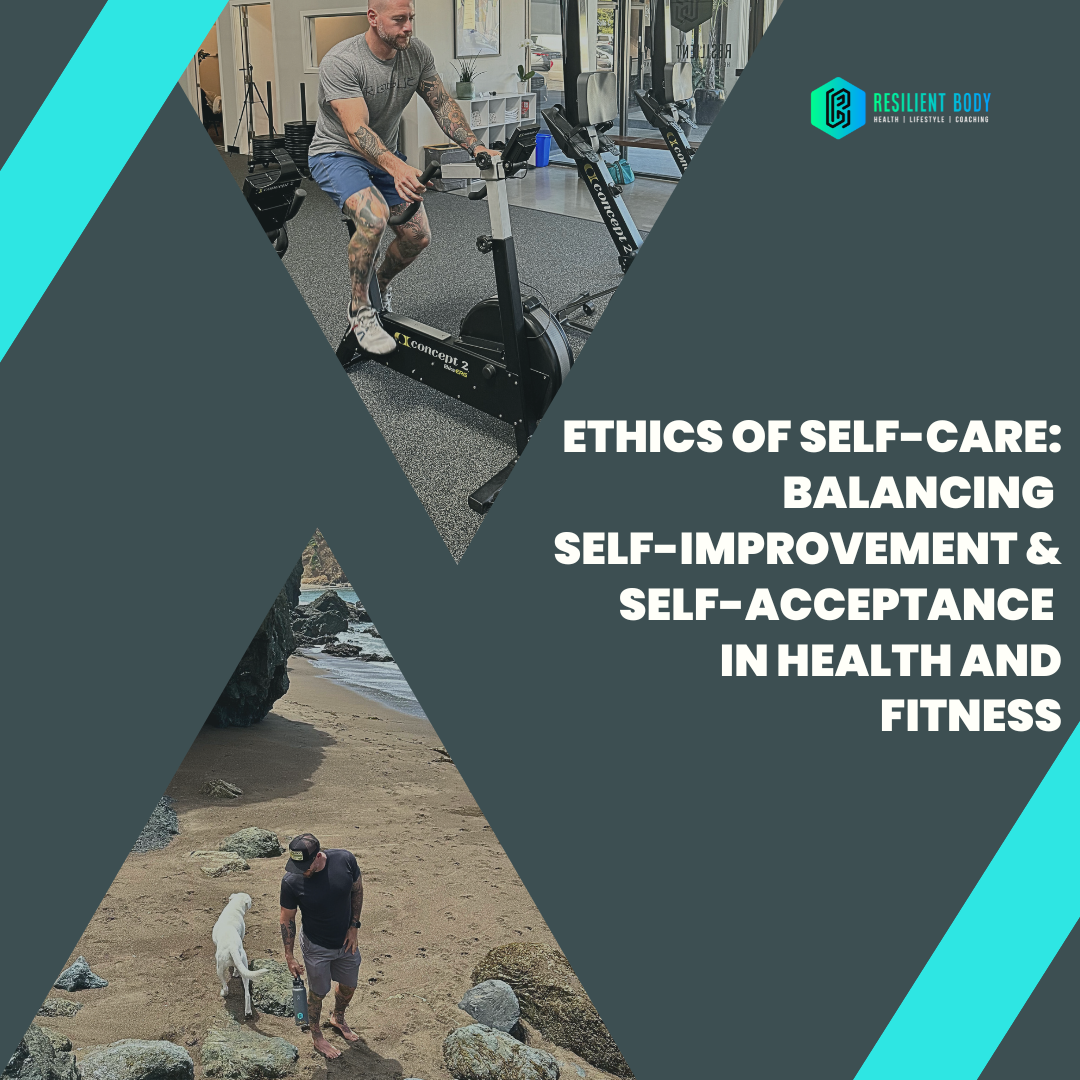Ethics of Self-Care: Balancing Self-Improvement &Self-Acceptance in Health and Fitness
As we talk about doing less (minimalism in exercise and nutritional habit focus) lately, we may be missing a key piece. What is the motivation behind these self-improvement behaviors?
Are you working extra hard during the Summer to change and improve? Reveal a slimmer waist or feel better in a swimsuit? Get stronger, healthier, feel more energetic? It's easy to get caught in the idea that you can change it all. Truthfully you have the power to make dramatic change, but there is a point where you need to also ask why you want to make these changes. Equally important may be finding a place where you can accept where you are at. Interestingly, finding the balance may allow you to make the most progress by removing your own thoughts of ideals as a barrier to finding your most optimal place. Afterall, some ideal of optimization can sure become exhausting if we aren’t enjoying what makes life meaningful for us.
Ethics of Self-Care: The Balance
In the hustle and bustle of modern life, self-care has emerged as a critical practice for maintaining mental and physical well-being. Yet, as we dive deeper into this journey, a crucial question arises: How do we balance the drive for self-improvement with the necessity of self-acceptance? This delicate equilibrium forms the ethical backbone of effective self-care in health and fitness. Often times we see this as a missing piece when we begin working with individuals, whether it be for personal training or even our manual therapy clients who might find us because they went a little too hard and got banged up. Finding a sustainable stride with self care routine can be tough for a variety of reasons, whether it be as simple as holding on to a "go hard or go home” mentality, or perhaps more complex factors like balancing personal and family obligations into a busy schedule.
The Quest for Self-Improvement
Self-improvement is a noble pursuit. It fuels our ambitions, pushes our boundaries, and inspires us to reach new heights. We love trying to find new areas to grow at Resilient Body. In the context of health and fitness, this often translates into setting goals, whether it's losing weight, building muscle, improving endurance, or achieving a specific skill.
There's an inherent positivity in striving to be better. It encourages discipline, fosters resilience, and cultivates a growth mindset. The gym becomes a sanctuary of progress, where each rep, each step, and each bead of sweat symbolize personal evolution. However, the relentless pursuit of improvement can sometimes blur into obsession, leading to burnout, injury, or mental fatigue.
The Necessity of Self-Acceptance
On the flip side, self-acceptance is the bedrock of a healthy self-concept. It involves acknowledging and embracing our current state without judgment. In a world bombarded with idealized images and perfectionist standards, self-acceptance is a radical act of kindness towards oneself.
Accepting oneself doesn't mean giving up on aspirations. Rather, it means understanding and respecting our bodies' natural limits and appreciating our inherent worth, regardless of external accomplishments. This compassionate approach reduces anxiety, boosts self-esteem, and promotes a sustainable, lifelong relationship with fitness rather than one of eventual burnout.
Quick Notes on Finding Balance
Balancing self-improvement with self-acceptance is an ethical dance that requires mindfulness and introspection. Here are some guiding principles to navigate this path:
Set Realistic Goals: Aim for progress, not perfection. We can’t overstate this one. Break down larger goals into manageable steps and celebrate small victories. Understand that setbacks are part of the journey, not the end of it and look for the opportunities to grow in these moments. Less reactivity and more curiosity.
Listen to Your Body: Tune in to your body's signals. Rest when needed, and don’t push through pain that feels harmful. Respecting your body's needs is a crucial aspect of self-care.
Cultivate a Positive Mindset: Focus on what your body can do, rather than what it can't. Celebrate your strengths and improvements, no matter how small they may seem. These add up big time over time.
Practice Mindfulness: Incorporate mindfulness practices like meditation or yoga. It can even be as simple as going for a walk and reflecting non-judgmentally. These practices can help you stay present, reduce stress, and enhance your connection with your body.
Seek Balance in Motivation: Ensure that your drive for improvement stems from a place of self-love, not self-loathing. Motivations grounded in positive self-regard are more sustainable and fulfilling.
Be Kind to Yourself: Many of you may find this difficult in a fitness scape that often sets values of self sacrifice and even flagellation to varying degrees. Treat yourself with the same kindness and compassion you would offer a friend. It’s ok to work very hard and counter extreme difficulty, but you must recover from your efforts and be gentle with your shortcomings.
The Ethical Imperative
In our quest for better health and fitness, let’s remember that true self-care is not just about changing our bodies but also about nurturing ourselves. By balancing self-improvement with self-acceptance, we create a harmonious path that leads to holistic well-being.
How are you approaching your goals be it this Summer or beyond? Do you practice balance in different ways and have you found strategies that work well for you? We would love to hear your experiences!
Some July Announcements:
We have a few personal training spots open and are running some specials on manual therapy if you are looking to work 1:1 or perhaps get some self care time. Book here using code MT15
Health coaching spots remain closed until the tail end of Summer, but will open this back up again soon along with another free seminar. If you’re interested, please book a free consult with us to get a jump start.


